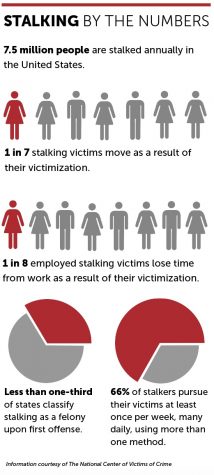WGRC hosts stalking awareness speaker series
February 4, 2019
Madison Hall was stalked while working as an intern in Washington, D.C. and was frustrated by how little police could do to stop it.
“I was told to get pepper spray and that they couldn’t do anything unless he actually physically tried to harm me,” Hall said. “One of the annoying things about stalking law, especially in Alabama, is in order to prove stalking is happening you have to prove that there is a perceived threat.”
Hall, a junior majoring in public relations, worked with the UA Women and Gender Resource Center (WGRC) to host a series of events and panels to raise awareness and train students on how to prevent stalking and handle the issue if they are being stalked.
According to the National Center for Victims of Crime, 7.5 million people are stalked in one year in the United States, and people aged 18-24 years experience the highest rate of stalking while being the least likely group to report.
This January marked the 15th annual National Stalking Awareness Month put on by the Stalking Prevention, Awareness and Resource Center (SPARC). According to SPARC’s website, National Stalking Awareness Month aims to “raise the issue of stalking as its own form of gender-based violence as well as a crime that frequently predicts and co-occurs with physical and sexual violence.”
According to Alabama law, stalking in the first degree is a class C felony that can warrant at least one year of jail time. However, stalking in the first degree is defined as “a person who intentionally and repeatedly follows or harasses another person and who makes a threat, either expressed or implied, with the intent to place that person in reasonable fear of death or serious bodily harm.”
Stalking in the second degree, without a perceived threat, is only classified as a Class B misdemeanor. As a result, simply being followed or repeatedly harassed by someone cannot be classified as a crime worthy of jail time.
“Right now, the law heavily relies on victims compiling evidence and enduring weeks and weeks of trauma to prove stalking is happening,” Hall said. “It’s already exhausting for a victim to have to go through trauma, but to force them to compile evidence while they’re being traumatized just seems so unfair. I would want to change the law in a lot of ways, but I feel like law enforcement should at least work to help the victim compile evidence.”
In observance of National Stalking Awareness Month, the WGRC held a variety of panels and training sessions for students. The panels provided different perspectives regarding stalking and allowed students to ask questions, learn how to file a report and receive bystander intervention training.
Jaclyn Northrup, director of the WGRC, said the center provides several resources for victims of stalking or domestic violence.
“If your safety is a concern then you should first call police, but if there are things happening that are not pressing safety concerns, I would advise students to talk to our victim advocate,” Northrup said. “You can talk through what you are seeing with a confidential source and focus on safety planning and emotional and physical well-being.”
According to the Title IX office, stalking is considered prohibited conduct under the UA sexual misconduct policy. If students or employees feel they are being stalked or harassed, they can report it to the office and the situation can be investigated.
Beth Howard, UA Title IX coordinator, said that while the number of stalking cases reported has remained relatively consistent over the years, online stalking is becoming a more prevalent issue.
“One of the things that we see more of is the use of social media for stalking,” Howard said. “You might share your location with friends, but people who want to stalk you are going to use those avenues, and it might be putting you at a greater risk of danger.”
Visit the WGRC and Title IX office for more information and resources regarding stalking and personal safety.





















